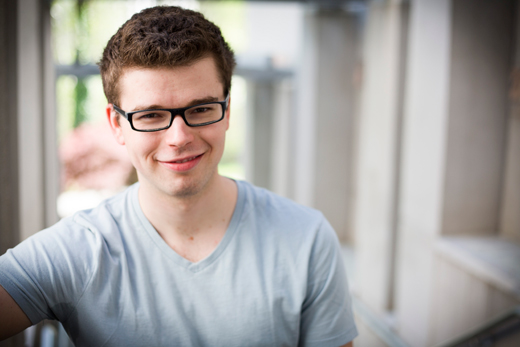Debate has been the central, unifying theme for much of Matthew Pesce's life. The Atlanta native came to Emory ranked third in the nation as a high school debater, living and breathing the dedication to excellence it takes to be among the very best. And that success continued with regular college tournament wins and top 10 national rankings during his four years here.
But knowing there is more to life than the thrill of successful competition, Pesce sought out ways to use debate to serve others. Throughout his time at Emory, Pesce has devoted himself to applying the skills and experience of debate – keen analysis of complex issues, critical thinking, and persuasive, civil argument – to help transform the Emory community.
He's also worked to bring the skills and benefits of debate training to Atlanta Public School students as a coach and mentor through the Emory-founded Urban Debate League (UDL).
"Matthew uses his fame in debate to be a role model for students who have not had the resources he has had to advance his education," says Melissa Maxcy-Wade, executive director of forensics at Emory and founder of the UDL, which currently has more than 25 chapters around the country.
"He's managed to balance a rigorous academic schedule leading to highest honors in political science, comprehensive participation in other student organizations, and a four-year commitment teaching debate in some of Atlanta's most socio-economically challenged secondary school communities," Wade says. "He is the kind of student who has already made contributions to leveling the playing field in education and is poised to have a profound post-graduate impact."
These qualities helped make Pesce the 2014 recipient of the Lucius Lamar McMullan Award. The McMullan Award, made possible by a generous gift from Emory alumnus William Matheson, '47G, recognizes Emory College graduates who show extraordinary promise of becoming our future leaders and rare potential for service to their community, the nation, and the world. The McMullan Award carries with it $25,000 –no strings attached.
Described by other nominators as "a Renaissance student, a scholar, leader, and friend" who "combines his thinking with practice," Pesce has taken on difficult leadership roles as chair of the Honor Council, working to ensure efficiency and fairness, while treating all students with dignity and respect. As chair of the Emory Elections Board, Pesce reformed the Student Government Association's election codes (after other unsuccessful efforts throughout the years), tying together 18 separate elections that happened throughout the year into a much simpler, streamlined process.
Pesce has lent his mature wisdom and professionalism to other groups as well, serving as president of Omicron Delta Kappa Honor Society and as a student representative on the Committee on Class & Labor, the Committee on Campus Life, and the College Curriculum Committee.
"He has demonstrated great skill at navigating the difficult waters of university bureaucracy in order to effect lasting, positive change," says Jason Ciejka, associate director of the honor council in Emory's Office of Undergraduate Education.
Using debate skills to help at-risk teens
Pesce will graduate with highest honors with a bachelor's degree in political science and a minor in development studies. As a SIRE (Scholarly Inquiry and Research at Emory) undergraduate researcher and a junior and senior fellow at Emory's Center for Law, Politics and Economics, Pesce has excelled academically. He recently worked as a conflict resolution intern at The Carter Center, while also completing an honors thesis on the Chinese rubber industry under adviser Rick Doner, professor of political science.
With all of his other involvement, Pesce has remained an active college debater, rising to 7th place nationally as a junior and serving as vice president of the Barkley Forum, Emory's award-winning debate program.
Pesce says the most challenging and rewarding activity has been as a mentor and instructor in Atlanta UDL, which uses the competitive motivation of tournament debate to teach the skills of critical thinking, computer research, oral presentation, and advocacy. The program offers guidance in public speaking, advice in college preparation, and role models to at-risk teenagers.
"It's been an amazing process to see struggling students gain confidence in themselves, learn to solve problems in constructive ways, engage with advanced material, and display tolerance for opposing viewpoints," Pesce says. "I came to understand the trials my students faced on a daily basis and the incredible opportunities education can provide."
After graduation, Pesce will work as a business analyst in the strategy and operations division at Deloitte. He plans to attend graduate school in economic development, business or law, with an eye toward a career in academia or in a civil servant role that will enable him to contribute to society through his service and leadership.
"In his character, his intellect, and his dedication to Emory, he is in every sense a model student and a remarkable person" Ciejka says. Adds faculty adviser Judy Raggi Moore, director of Emory's Italian Studies program, "Matthew strives to give his honest best in all in which he engages…His desire to contribute to a better world comes from a deeply felt urge to give back, to help others as he has been helped, and to encourage all to strive to be their best."

